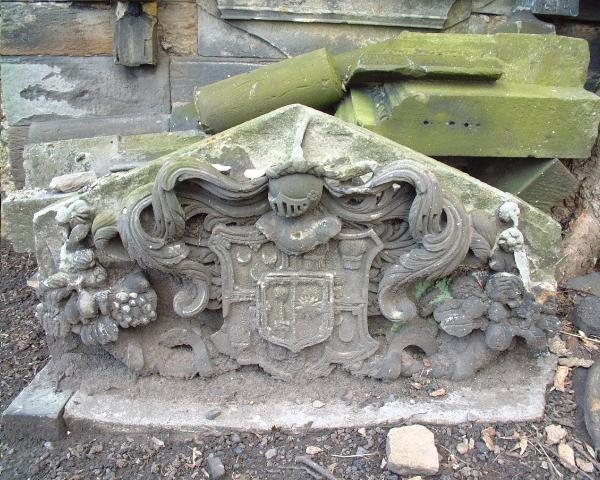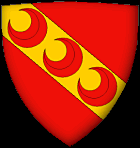| |
|
The Arms of the Seton Family |
|

 The
falconer was dinning in his ears, his eye continued intent upon so
interesting an object of observation; and at length, as the
damsel, just about to dive under one of the arched passages which
afforded an outlet to the Canongate from the houses beneath, (a
passage, graced by a projecting shield of arms, supported by two
huge foxes of stone,) had lifted her veil for the purpose perhaps
of descrying who the horseman was who for some time had eyed her
so closely, young Roland saw, under the shade of the silken plaid,
enough of the bright azure eyes, fair locks, and blithe features,
to induce him, like an inexperienced and rash madcap, whose wilful
ways never had been traversed by contradiction, nor much subjected
to consideration, to throw the bridle of his horse into Adam
Woodcock’s hand, and leave him to play the waiting gentleman,
while he dashed down the paved court after Catherine Seyton—all
as aforesaid. The
falconer was dinning in his ears, his eye continued intent upon so
interesting an object of observation; and at length, as the
damsel, just about to dive under one of the arched passages which
afforded an outlet to the Canongate from the houses beneath, (a
passage, graced by a projecting shield of arms, supported by two
huge foxes of stone,) had lifted her veil for the purpose perhaps
of descrying who the horseman was who for some time had eyed her
so closely, young Roland saw, under the shade of the silken plaid,
enough of the bright azure eyes, fair locks, and blithe features,
to induce him, like an inexperienced and rash madcap, whose wilful
ways never had been traversed by contradiction, nor much subjected
to consideration, to throw the bridle of his horse into Adam
Woodcock’s hand, and leave him to play the waiting gentleman,
while he dashed down the paved court after Catherine Seyton—all
as aforesaid.Women’s wits
are proverbially quick, but apparently those of Catherine
suggested no better expedient than fairly to betake herself to
speed of foot, in hopes of baffling the page’s vivacity, by
getting safely lodged before he could discover where. But a youth
of eighteen, in pursuit of a mistress, is not so easily
outstripped. Catherine fled across a paved court, decorated with
large formal vases of stone, in which yews, cypresses, and other
evergreens, vegetated in sombre sullenness, and gave a
correspondent degree of solemnity to the high and heavy building
in front of which they were placed as ornaments, aspiring towards
a square portion of the blue hemisphere, corresponding exactly in
extent to the quadrangle in which they were stationed, and all
around which rose huge black walls, exhibiting windows in rows of
five stories, with heavy architraves over each, bearing armorial
and religious devices.
Through this court Catherine Seyton
flashed like a hunted doe, making the best use of those pretty
legs which had attracted the commendation even of the reflective
and cautious Adam Woodcock. She hastened towards a large door in
the centre of the lower front of the court, pulled the bobbin till
the latch flew up, and ensconced herself in the ancient mansion.
But, if she fled like a doe, Roland Graeme followed with the speed
and ardour of a youthful stag-hound, loosed for the first time on
his prey. He kept her in view in spite of her efforts; for it is
remarkable what an advantage, in such a race, the gallant who
desires to see, possesses over the maiden who wishes not to be
seen—an advantage which I have known counterbalance a great start
in point of distance. In short, he saw the waving of her screen,
or veil, at one corner, heard the tap of her foot, light as that
was, as it crossed the court, and caught a glimpse of her figure
just as she entered the door of the mansion.
Roland Graeme, inconsiderate and
headlong as we have described him, having no knowledge of real
life but from the romances which he had read, and not an idea of
checking himself in the midst of any eager impulse; possessed,
besides, of much courage and readiness, never hesitated for a
moment to approach the door through which the object of his search
had disappeared. He, too, pulled the bobbin, and the latch,
though heavy and massive, answered to the summons, and arose. The
page entered with the same precipitation which had marked his
whole proceeding, and found himself in a large hall, or vestibule,
dimly enlightened by latticed casements of painted glass, and
rendered yet dimmer through the exclusion of the sunbeams, owing
to the height of the walls of those buildings by which the
court-yard was enclosed. The walls of the hall were surrounded
with suits of ancient and rusted armour, interchanged with huge
and massive stone escutcheons, bearing double tressures, fleured
and counter-fleured, wheat-sheaves, coronets, and so forth, things
to which Roland Graeme gave not a moment’s attention.
Sir Walter Scott's, "The
Abbott", and the description of the Seton's Cannongate House.
________________________________________________________
 Anders Seton of Sweden Anders Seton of Sweden

| |
 |
 |
The Seton Shields
 
The Lyon Court Roll of Arms

Sir Iain Bruce Seton of
Abercorn

Sir Charles Wallace Seton
of Pitmedden's Arms

The Lords Seton,
Earls of Winton

The Earl of Dunfermline

Viscount of Kingston

___________________
The Earl of Eglinton and Winton
The Duke of Sutherland
The Duke
of Gordon
The Edmonstones
Family
Seton and Edmonstone
|